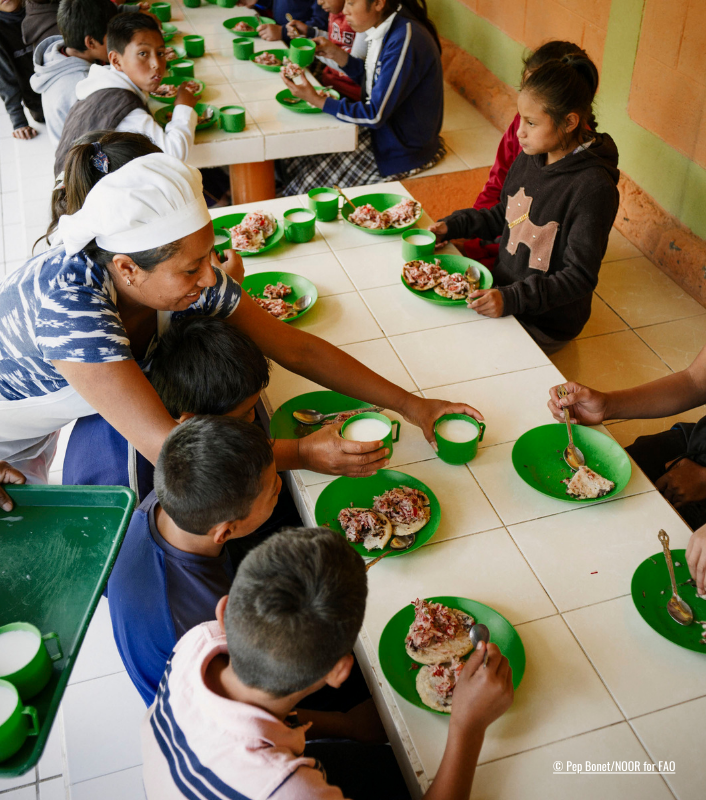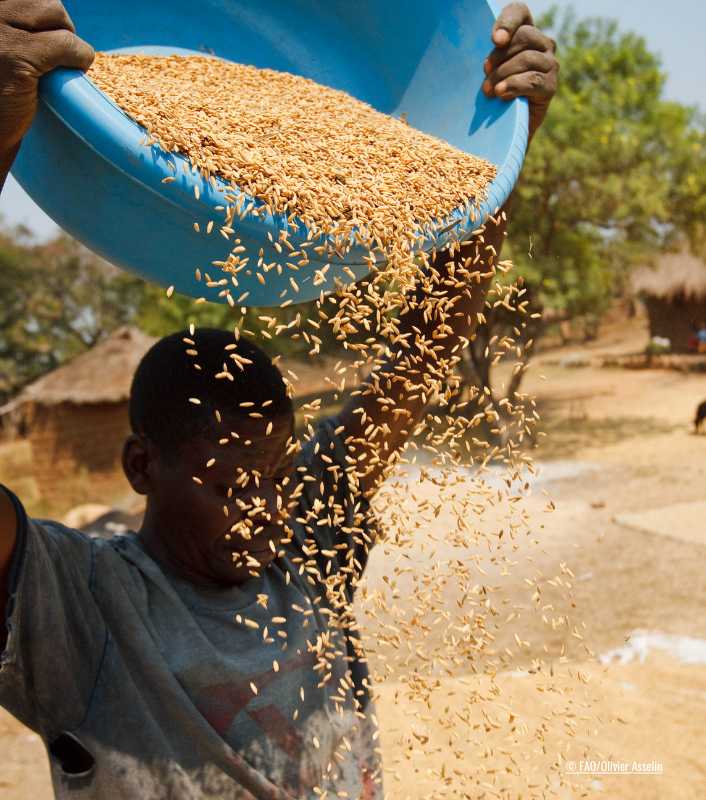COUNTRY ASSISTANCE
Nourish all people
School Meals Coalition
Type of Assistance
- Strategies and policies formulation: support the formulation or review of national food system related strategies, policies and legal frameworks. Normative guidance: e.g. development or review of guidelines and how to use them at country level
- Analytics: assessments, analysis, data collection, evidence generation and monitoring, solution scanning and modeling. Monitoring and Evaluation support: identifying meaningful progress indicators, developing results frameworks and M&E plans
- Mobilize resources including developing investment cases for financial assistance to pathways implementation
- In-country technical support missions for pathways development, operationalization or implementation (system-wide or thematic). Expert assistance: deploy or assign expert to country remotely or physical or maintain roster of experts and thought Leaders
Coverage: Global
Summary of Assistance:
The School Meals Coalition, a government-led initiative, is rooted in country-level action. Through its initiatives and partners, it supports governments in scaling up and strengthening national school meal programmes.Three initiatives have been launched so far. Among others, the coalition supports by carrying out case studies, developing financial plans, conducting data analysis, and strengthening the capacity of stakeholders in countries.
The Research Consortium for School Health and Nutrition, led by the London School of Hygiene & Tropical Medicine, generates evidence on school health and nutrition programmes, and provides policymakers with programmatic guidance. The Consortium provides systematic reviews of the impact of school meals, develops case studies, establishes common frameworks of indicators and quantifies the return of investment of these programmes.
The Sustainable Financing Initiative, led by the Education Commission, works with governments and donors to increase and better coordinate financing (domestic and international) for school meal programmes, with a particular focus on low-income and lower-middle-income countries. It undertakes landscape analysis of global financing, generates additional knowledge around funding mechanisms, identifies opportunities for donors to better coordinate and co-invest in school meal programmes.
The Data and Monitoring Initiative, led by WFP, monitors and reports on the three objectives of the School Meals Coalition. It focuses on engaging countries to establish a core set of indicators related to school meals, establish a set of defined processes that help governments systematically capture and report data and create a database on school meals and complementary activities, as a global public good.
Focal Points and Contact: GLOBAL.SMCSECRETARIAT [email protected] ; Constanza Peña Ugarte, [email protected] ; Ogom Anagwu, [email protected] , Sandra Hittmeyer, [email protected]
Relevant Links & Documents: Website


Fortified Whole Grain Alliance
Type of Assistance
- Strategies and policies formulation: support the formulation or review of national food system related strategies, policies and legal frameworks. Normative guidance: e.g. development or review of guidelines and how to use them at country level
- In-country technical support missions for pathways development, operationalization or implementation (system-wide or thematic). Expert assistance: deploy or assign expert to country remotely or physical or maintain roster of experts and thought Leaders
- Mobilize resources including developing investment cases for financial assistance to pathways implementation
Coverage: Benin, Burundi, Egypt, Ghana, Kenya, Nigeria, Rwanda and Senegal. Languages: English.
Summary of Assistance:
The Fortified Whole Grain Alliance (FWGA) is a coalition of stakeholders that span across the food system, including nonprofit and private sector partners and members, and is committed to increasing the global consumption of fortified whole grains.
The Alliance's vision is to ensure consumption of at least 50% of grain foods in institutional markets and 25% in consumer markets in fortified whole form in Low and Middle Income Countries by 2032. Work is under way in 3 countries (i.e., Kenya, Rwanda, and Burundi) with initial focus on maize, rice, and wheat to shift to fortified wholegrain through its initiatives.
The FWGA’s initial focus is on initiatives that support the downstream linkages between processors and customers (i.e. institutional programs), to secure volume offtake and ensure processors are enabled to meet this demand. This approach enables the Alliance to measure and demonstrate success in volume terms. The FWGA is also investing in cross-country foundational efforts in funding, expertise and operational capacity development, R&D on FWGs, data, analytics and evidence generation, advocacy and social marketing, and policy and institutional capacity development.
In the future, the Alliance will expand its focus to FWG products that include millet, sorghum, and other local nutritious and hardy grains, as well as fortified whole blends incorporating whole grains, pulses, seeds, protein-rich powders, and other nutritious foods.
Focal Points and Contact: David Kamau, [email protected] , Peiman Milani, [email protected] , Daniel Ndungu, [email protected] , Vanessa Ombura, [email protected]; [email protected]
Relevant Links & Documents: Website
Global Alliance for Improved Nutrition (GAIN)
Type of Assistance
- National Pathway formulation, update or operationalization: support governments through the development of implementation plans, costing and prioritization of interventions, or assistance to strengthening governance structures for Pathway implementation
- Strategies and policies formulation: support the formulation or review of national food system related strategies, policies and legal frameworks to strengthen alignment of policy, both in development and implementation, across sectors towards food system goals. Normative guidance: e.g. development of toolkits and guidelines and how to use them at country level
- In-country technical support for pathways development, operationalization or implementation (system-wide or thematic). Expert assistance: country office leadership to deploy or assign expertise to country remotely or physical or maintain roster of experts and thought Leaders
Coverage: Global (dependent on program)
Summary of Assistance:
The Nourishing Food Pathways Programme is a multi-donor funded programme supporting 10 African and Asian countries where GAIN has country presence to support governments in the implementation of their food systems pathways. It aims to accelerate food systems transformation to improve the consumption of safe nutritious foods in an environmentally sustainable way. The programme involves intensive work led by GAIN’s country-based policy advisors who work closely with government policy units to strengthen alignment of policy across sectors in supporting the further development and implementation of food systems pathways in line with the priorities identified by governments.
This work will include the further development of the pathways into action plans, strengthening multi-stakeholder approaches, capacity building and knowledge sharing. In doing so, the programme will inter alia, work to: Include voices of youth and stakeholders at local levels; Ensure that low-income consumers can access markets through strengthened social protection systems and by making safe nutritious food more accessible; Align and increase private sector finance by creating incentives for businesses, by developing ESG (Environmental Social and Governance) standards that incorporate food and nutrition goals and by working with Development Finance Institutions (DFIs) to create mechanisms that attract private sector investment towards SMEs. In addition, GAIN will work on how to define and measure food systems transformation, as well as bringing out exemplars of food systems transformation.
Focal Points and Contact: Cat Kissick, [email protected], Anouk de Vries, [email protected], Jamie Morrison, [email protected]
